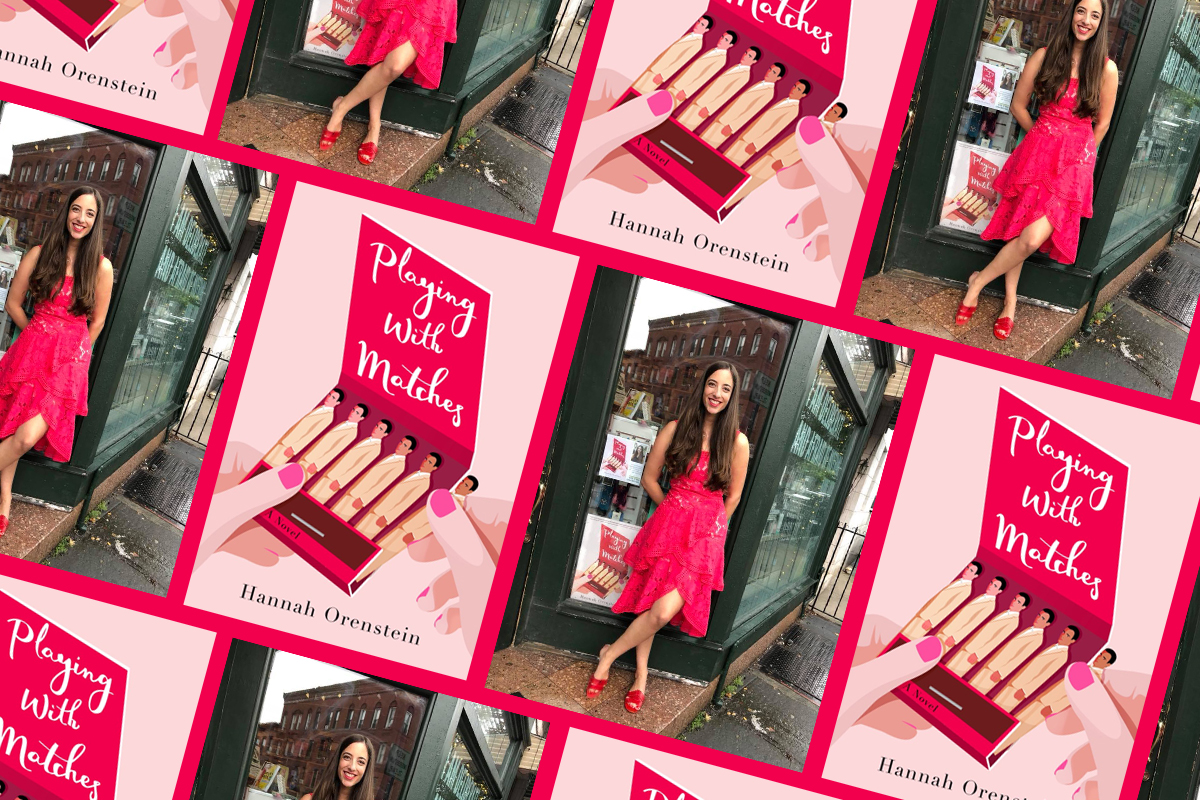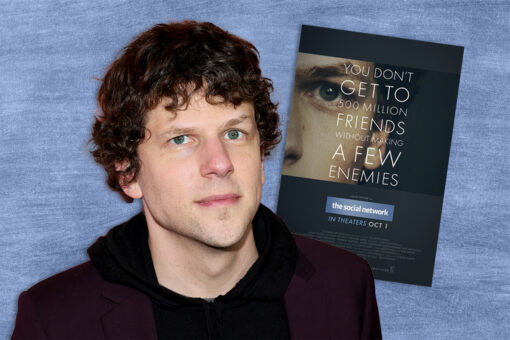Hannah Orenstein’s debut novel, Playing With Matches, follows recent college grad Sasha Goldberg as she embarks on an unexpected career as a matchmaker in New York City. Orenstein knows what she’s writing about — at age 21, she became the youngest matchmaker at a top dating service. Now 25 and living in Manhattan, where she works as the dating editor for Elite Daily, Orenstein spoke with Alma about using her life to inspire her fiction, her best dating tips, and how matchmaking nearly ruined her own dating life.
This interview has been edited and condensed.
Considering you have real matchmaking experience, why did you decide to write this story through fiction as opposed to non-fiction?
I don’t really have any interest in writing non-fiction. I loved the idea of writing about the world of matchmaking because it’s such a unique job that I don’t really see portrayed that much in pop culture. I thought it would be a really fun setting for a rom-com, which is the kind of book I always wanted to write because it’s what I like to read the most. I wanted the freedom to explore and play around with new characters and different ideas and plotlines, so the matchmaking elements are certainly inspired by real life, but to me it felt much more satisfying and creative to make that my own.
How did you first fall into matchmaking?
It’s sort of a long, twisted story. Essentially, I grew up in Boston reading the Boston Globe Magazine, and they have this column every week called “Dinner with Cupid,” in which an editor sets up two people on a blind date and then interviews them about how the date went. I loved reading this. Every week in middle school and high school, I would read it with my dad. Once I moved out and went off to college, he would still send it to me every week and we would debate the column.
When I started writing for my college’s student blog, called NYU Local, I decided to pitch a version of this. So I would set up two NYU students on a blind date, I would interview them about their date, and I would write something online about how it went. The column did really well, it was super fun. I did it for about a year, setting up couples regularly. I wasn’t particularly good at it — I didn’t really know what I was doing; I was a complete amateur. But I knew it was something I really enjoyed.
The fall of my junior year of college, I was interning at Elle magazine, [where I met] the advice columnist, E. Jean Carroll — she’s an editor at the magazine but she also has a matchmaking service. I emailed her after working on a project with her and I told her about the matchmaking I was doing on campus and she loved that. She immediately wrote back and said, “How can I convince you to come work for me?” I was 20 years old, I was really unsure if I wanted to be a matchmaker, I was unsure how that fit into my career path — I was really set on graduating and writing for magazines. But I went to go study abroad, and then I came back to New York that summer when I was 21, and I joined E. Jean’s company. I started working as a matchmaker for her that summer, and then I continued into the school year.
Were there any particularly dreadful experiences as a professional matchmaker?
I was really way in over my head. I was 21, but I was setting up clients in their 30s and 40s. I really did not know a thing about love. My most formative romantic experience to date at that point was getting dumped at a gourmet grocery store. I really did not know what I was doing. I felt this sense of imposter syndrome — I didn’t want my clients to know how old I was. I was afraid that if they knew the truth about my age, they wouldn’t trust me, they wouldn’t have faith in me. So I spent a lot of time and energy hiding my age. I never outright lied to them, but I was purposefully vague because I felt a lot of shame about feeling inexperienced, even though I was very confident in my training. I thought I had learned a lot from my bosses, but it’s still a little awkward to be a 21-year-old matchmaker.
In the book, Sasha uses dating apps to find people to set her clients up with. Is that really how it works?
Yes, when I was matchmaking we had a database of thousands of people, but if I didn’t think anybody in the database was a great fit, I would turn to dating apps, I would turn to people in my own networks, I would go out into the city and try to find people. We used all sorts of methods.
There’s a history of Jews and matchmaking — Fiddler on the Roof, yentas, etc. Do you feel your own Jewish background played a part in your interest in matchmaking?
I actually don’t. I think it was pretty separate. But one thing that did work to my advantage was that I wound up with a lot of Jewish clients — a lot of Jewish women clients. And that was really easy for me because they would say, “This is my type,” and I would think, wow, I understand that, that’s my type, too. Not to say all Jewish women are interested in the same kind of person, but it did make it a little bit easier because I really did understand where they were coming from and what they were looking for.
Do you think that your experience being a matchmaker has helped you in your own personal dating life?
I think it might have hindered my dating life. Matchmaking requires an enormous amount of emotional energy. It’s a great job for an extrovert, which I am not. So the process of putting myself out there, having these really deep, personal, intense conversations with dozens of people every day was really draining. I think that sort of depleted my energy when it came to dating in my own life. At the same time, it made me a little bit overly confident. A lot of people I went out with thought I was this dating expert who knew everything there was to know about dating, when in fact I’m just an average person who happened to have this interesting job. People would say, “I’m so intimidated.” They would check in with me to see how they were doing on dates. That dynamic was really uncomfortable. There’s nothing less sexy or attractive than a person who’s not confident enough to get through a date without asking how they’re doing.
Would you ever consider personally using a matchmaker?
I’m in a relationship now, so no.
How did you meet?
It’s sort of a digital age rom-com, I guess. I was working at Elite Daily, which I still am, but when I first started my job I was doing a lot more writing than I am now, and I would go on dating apps to find people to talk to me about dating when I needed sources. So I was swiping through people to interview about dating, and I swiped across this one guy, who I did a very brief interview with on Tinder. He didn’t answer my follow up question, he just sort of drifted off. A week or two later I was on Hinge, which I used for my personal life, and we reconnected [there]. Turns out he’s actually a software engineer for Hinge. He asked me out for drinks. We’ve been together for eight months.
What was the most challenging part of writing your book?
I loved writing the first draft. I had a lot of fun with it. But it did need a lot of work to get to a second draft, and to the point where I felt comfortable pitching it out to agents. Approaching a first draft that is messy and in need of a lot of revision is a really challenging thing to do. One of my biggest hurdles was working up the motivation to stick to it and see it through.
What is one essential dating tip you’d give to women in the dating scene right now?
If you’re on dating apps, don’t send a first message that says, “Hi;” “Hey;” “How are you?” “How was your weekend?” Everybody sends those. Depending on what app you’re using, 20-25% of first messages are along those lines. They’re super boring, they don’t really generate interesting conversation, they don’t set you apart.
And if you’re not sending the first message, I would say do that, because what easier, quicker way to set yourself apart?
Do you like the dating apps?
Yes. I know that they’re not for everybody. I understand why people have reservations. But personally, they’ve given me not just a relationship, but a career and a book. So I can’t really knock them. I think that they open up doors to meeting people that you would have never met otherwise, and I think that’s a really awesome thing — especially if you’re shy, if you don’t like going to bars, if you’re not a big drinker, if you live in a rural area, if you are gay and there aren’t a lot of gay people in your community, if you’re disabled and can’t really get out and meet people at a bar. They open up so many windows — I think they’re a great force for society.
What is your ideal date?
I would love to do a picnic in Central Park with some great cheese, a bottle of rosé, some nice music, lay out, hang out, walk around the park, talk, read a good book.
What is your ideal bagel?
This is the question that gets me most excited. My favorite bagel in New York is the egg everything bagel at Bagelsmith in Williamsburg with jalapeño cream cheese, toasted.



